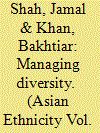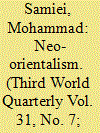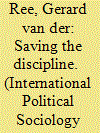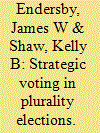|
|
|
Sort Order |
|
|
|
Items / Page
|
|
|
|
|
|
|
| Srl | Item |
| 1 |
ID:
191787


|
|
|
|
|
| Summary/Abstract |
Modern societies are confronted with a plethora of issues that have far-reaching socio-political ramifications. The negative effects of diversity are primarily the result of state policies. Where societies were not homogenous, attempts were made to bring desperate populations together to advance official nationalist projects. Pakistan, being dominantly a Muslim state, has religio-cultural and ethnic diversity where minority groups have raised their voices against the unjust state’s policies. This study examines how these issues evolved over the course of Pakistan’s history. The paper attempts to answer the question ‘why has Pakistan’s plurality become unmanageable?’ The results demonstrate that a high degree of centralization of authority, the adoption of Urdu as a national language, a sense of domination of the central institutions by the Punjabis, underrepresentation of ethnic minorities in state institutions, and controlled society has aggravated the position of diverse groups in Pakistan, with colossal consequences to national economy and social harmony.
|
|
|
|
|
|
|
|
|
|
|
|
|
|
|
|
| 2 |
ID:
100325


|
|
|
|
|
| Publication |
2010.
|
| Summary/Abstract |
Orientalism, as Edward Said used the term, can be defined as an ideology which promotes the 'West-and-Islam' dualism and the idea that 'Others are less human'. Since Said first published his ideas in 1978, however, the world seems to have become much more interdependent and political interrelations between the West and Islam have changed dramatically. Consequently this dualism, though more or less in place, has been influenced by escalating waves of globalisation and redistributed and reshaped in a different form. Some promising changes, as well as some additional dualistic tendencies, that can define neo-Orientalism are found in this new era. This paper attempts to analyse elements of change in traditional Orientalism. To portray a better future for our interdependent world some new approaches to identity, global ethics and global civil society are suggested. Eradicating the roots of Orientalism and Occidentalism alike and accepting, protecting and even promoting diversity are first steps towards countering the devastating threats that endanger humankind as a whole.
|
|
|
|
|
|
|
|
|
|
|
|
|
|
|
|
| 3 |
ID:
132388


|
|
|
|
|
| Publication |
2014.
|
| Summary/Abstract |
For several decades, the field of International Relations theory has been preoccupied with its own methodological and theoretical plurality. As a consequence, IR scholars have proposed a range of different solutions to this "problem." In doing so, they have drawn from different sources of social capital in the field, allowing them to base their legitimacy on the ways they relate to "progress" and the status quo. Drawing from Bourdieu's sociology, this article will explore five different strategies for "saving the discipline" and show how they relate to different kinds of scientific capital and power relations in the field. It will also explore the ways in which social conventions (such as politesse) can be used as tools for symbolic violence. The article will finish by arguing that rather than a problem to be resolved, plurality functions as an organizing principle regulating social power relations in the field.
|
|
|
|
|
|
|
|
|
|
|
|
|
|
|
|
| 4 |
ID:
092565


|
|
|
|
|
| Publication |
2009.
|
| Summary/Abstract |
Experiments designed as an election simulation involve participants in an investigation of strategic voting. Participants assigned political preferences and informed of candidate/party positions on an ideological dimension respond to and learn the results of two public opinion polls before voting. When given two alternatives, the participants vote sincerely. Confronted with three or more alternatives, participants make tactical decisions to narrow the field. Strategic behavior quickly reduces the number of alternatives to two. Consistent with Duverger's law, candidate/party viability encourages strategic voting and the development of a two-party system. The election simulation serves as a useful tool to teach about electoral behavior and to explore topics such as strategic voting.
|
|
|
|
|
|
|
|
|
|
|
|
|
|
|
|
|
|
|
|
|